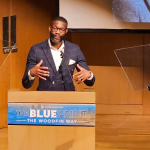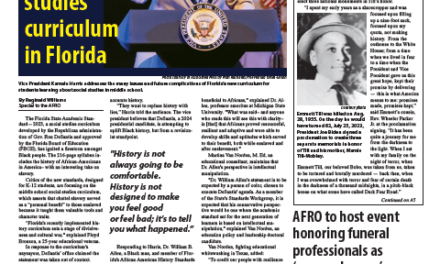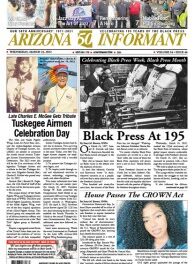Birmingham Mayor Randall Woodfin speaks to a standing room crowd at the Birmingham Museum of Art as he unveils strategic updates about Birmingham’s future. (Barnett Wright, The Birmingham Times)
” data-medium-file=”https://www.birminghamtimes.com/wp-content/uploads/2023/12/Blueprint-1–300×193.png” data-large-file=”https://www.birminghamtimes.com/wp-content/uploads/2023/12/Blueprint-1-.png” />
By Barnett Wright
The Birmingham Times
Mayor Randall Woodfin on Thursday provided a series of strategic updates titled “The Blueprint” which he said was a plan driven by “the spirit of change and … the forward-thinking vision that has made the city a beacon for progress worldwide.”
Speaking to a standing room crowd at the Birmingham Museum of Art two years into his second term and 60 years after the struggle for Civil and Human Rights in the city, the mayor made sure to note the city’s groundbreaking change in 1963, a watershed moment for the Civil Rights movement.
“From 1963 to 2023, we’re rewriting our future,” Woodfin said. “This blueprint is Birmingham’s manifesto for our next great breakthrough.”
His administration spent its first term “listening to the needs of residents and tearing down what wasn’t working – old buildings, old systems, old ways of thinking … old barriers that blocked progress. In term two, we’re rebuilding,” said Woodfin, first elected in 2017 and re-elected in 2021.
Part of the rebuilding process means “restoring faith in our young people by providing them with opportunities to achieve their potential,” he said.
In addition, “we’re making roads smoother. We’re making parks more accessible. We’re building homes – and most importantly, we’re building systems to allow new homeowners to achieve their dreams,” he said.
The mayor spoke before an audience that included City Councilors, department heads, senior staff and residents and told of how he asked residents in 2019 to picture a mother or grandmother in Birmingham whose roots run deep in her neighborhood where she’s lived most of her adult life currently raising her child or grandchild.
“We got more aggressive with our weed abatement program as well as increased our funding for our land bank to build a single-family home on that same empty lot to her left,” he said.
“We invested in our sidewalks to make sure that sidewalk was walkable and bikeable for that child or grandchild. We also put millions into street paving to make sure that street is paved and pothole-free.
“Simply put, our first term was marked by tearing down things that didn’t work and laying the groundwork for a better path forward,” he said.
While that was a step in the right direction, his team knew there was more work to be done, he told the audience.
Following his re-election two years ago as the city was coming out of COVID a commitment was made to “progress together,” he said.
“First, we listened to our residents and took major steps in addressing the food deserts in Five Points West, with the opening of Food Giant,” he said.
He also talked about increased opportunities for children.
“And let’s start with Birmingham Talks, a free citywide program that works with children from birth to three years old to help build lifetime literacy. ..We have the data that continues to show us that the building blocks between ages 1 and 5 is where we need to make investments,” he said.
The mayor spoke on one of his signature programs, the Birmingham Promise a free scholarship and $15 an hour apprenticeship program. “Through the Promise, we are ensuring that graduates of Birmingham City Schools can attend any public college or university in Alabama tuition free.”
Since 2020, more than $5 million in scholarships have been distributed to nearly 1,000 Birmingham City Schools students, he said.
“This is how we build a workforce,” Woodfin said. “This is how we retain talent in our state. This is how we break generational curses and provide opportunities for the next generation.”
Crime
Public safety is still a major issue in the city, particularly as it relates to gun violence, the mayor said.
“And although I applaud BPD (Birmingham Police Department) for their work for taking nearly 17,000 guns off the streets during our administration, I’ve often said public safety cannot just be a BPD issue. It’s a community issue, and we all must buy-in,” Woodfin said.
“We have spent $8 million annually for gun violence prevention, re-entry programs and mental health services for our students.”
He said the city’s conflict resolution programs, which first started with high school males, “have expanded to female students, elementary schools and students who live in the housing authority, all thanks to the Common Ground program, which puts students who have been selected by individual school principals into one or two cohorts at each Birmingham City middle and high school with two coaches per cohort.
The city has also launched the Connect Birmingham program “where we’re encouraging business owners to register their security cameras with us to help identify issues in case of a crime or incident,” he said. “I want to emphasize that the privacy of those who participate in this program will be protected. Nor will footage be used without your knowledge. And I highly encourage you to participate by visiting birminghamal.gov/connectbirmingham.










